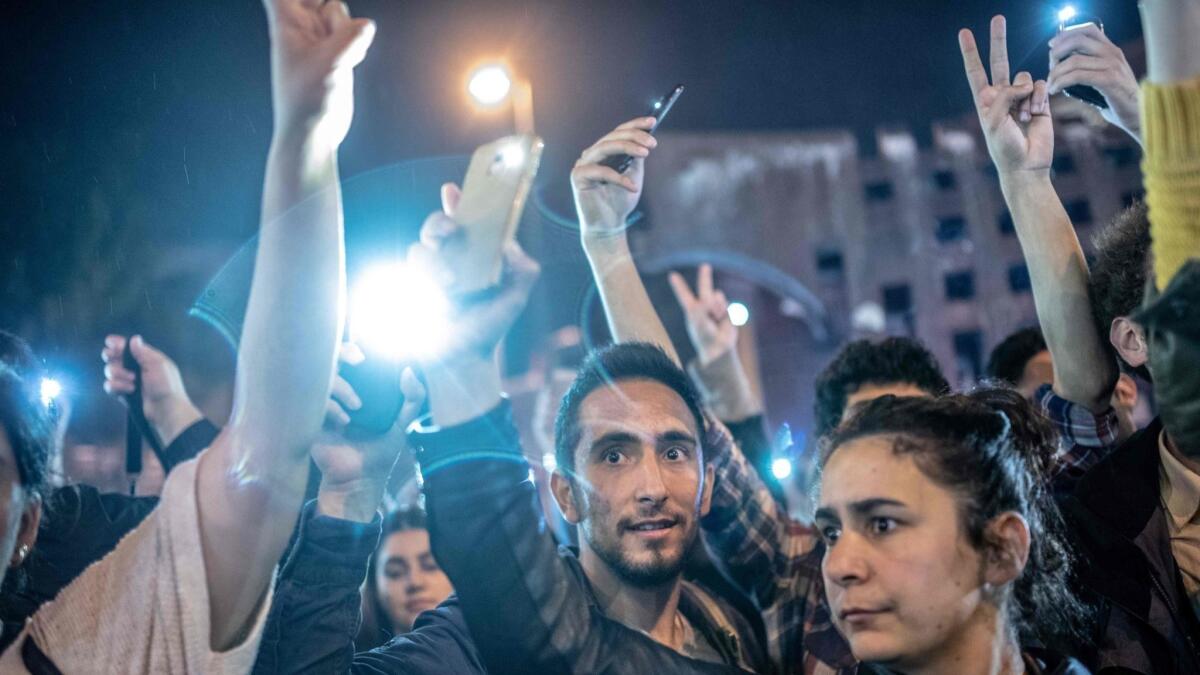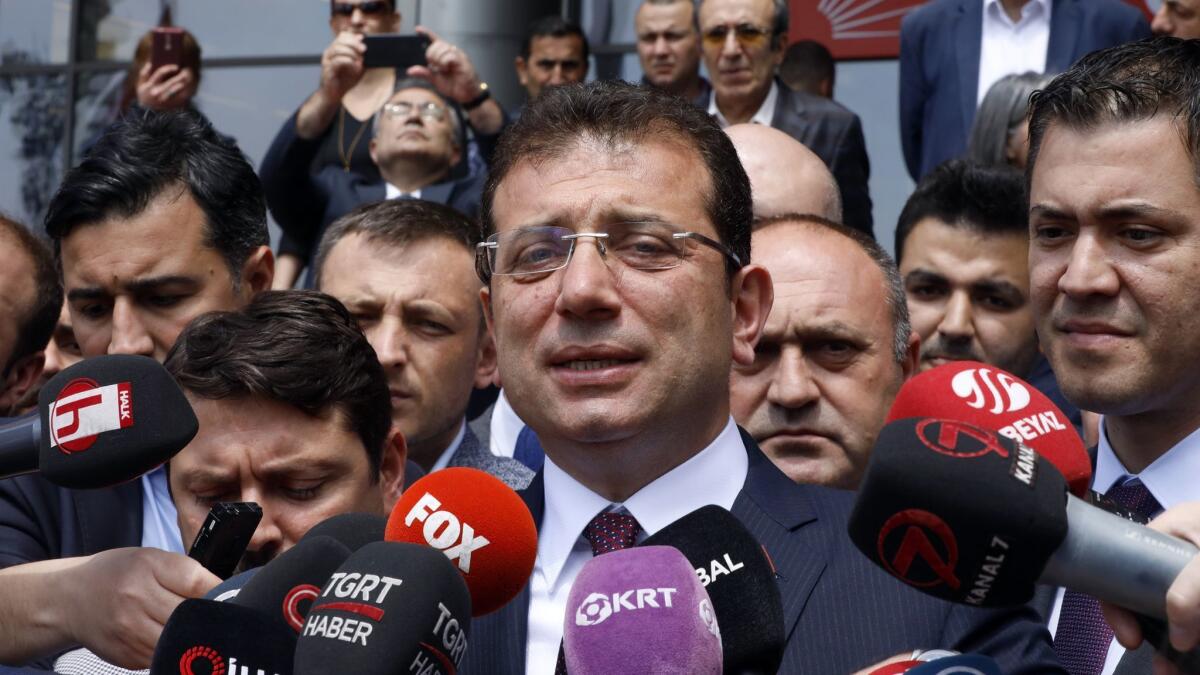Many in Turkey see voiding of Istanbul vote as latest sign of Erdogan’s autocracy
- Share via
Reporting from ISTANBUL, Turkey — Turkey’s President Recep Tayyip Erdogan on Tuesday sought to cast himself as a defender of democracy, even as critics warned that overturning a municipal election result in the country’s largest city signaled an accelerating slide into authoritarianism.
Turkey’s highest electoral authority on Monday ordered a do-over of a March vote that saw an opposition politician elected as mayor of Istanbul, the sprawling metropolis on the shores of the Bosporus that is the country’s commercial capital – and the hometown of Erdogan, 65, whose political rise began there in the 1990s.
The decision by the High Election Board — which followed heavy hints by Erdogan that the earlier result ought not stand — rattled investors, sent Turkey’s lira plunging and drew sharp rebukes from European leaders and some U.S. lawmakers, though not the Trump administration. As a NATO member, Turkey is an important U.S. ally, although one that has been increasingly at odds with the Washington establishment.
Recent years have seen a series of draconian measures by Erdogan to consolidate his powers. He has carried out massive purges of the security apparatus, the judiciary and the news media. Tens of thousands of dissidents, real or suspected, are behind bars.
The Turkish president secured a new five-year term in elections last year, and engineered constitutional changes that transformed a once-ceremonial post into the seat of power.
Even so, some analysts saw the overturning of an election result in Istanbul as crossing a new frontier. Soner Cagaptay of the Washington Institute for Near East Policy, writing on Twitter, called it a “seismic” change in the country’s political life.
After the electoral board’s announcement, residents in some Istanbul neighborhoods, particularly opposition strongholds, staged protests that were noisy but carefully calculated to avoid any police response — clanging pots and pans together, switching lights off and on.

Immediately after the vote, Erdogan and his allies offered scant proof of any serious irregularities, lacing demands for annulment of the results with elaborate conspiracy theories. Some of the alleged technical violations were similar to those dismissed in past votes as inconsequential to the result, such as some polling places being overseen by professionals such as accountants and teachers, who were not part of the civil service.
Speaking to parliamentary supporters in the capital, Ankara, on Tuesday, Erdogan employed a favorite rhetorical stratagem: turning accusations of wrongdoing back at his accusers.
Calling the electoral board’s decision “an important step to strengthen our democracy” against cheating and corruption, the president railed against what he characterized as the usurping of votes rightfully cast for his party.
From the opposition, the narrative was precisely the opposite. Some likened the overturning of the vote result to a coup — a loaded accusation in a country that has suffered many of those.
The March 31 municipal elections across the country yielded several other losses for Erdogan’s Justice and Development Party, known by its Turkish initials AKP. It failed to secure control of Ankara, the capital, or of Izmir, another major city.
But the loss of Istanbul, where Erdogan launched his political career by serving as mayor, was seemingly insupportable. During the years of his party’s control of the municipality, Erdogan often cited the maxim that “he who wins Istanbul wins Turkey.” But over time, reports of lucrative patronage deals for those in the president’s inner circle fueled voter resentment.

The president reportedly seethed in the weeks following the recent vote, as a partial recount of the close election reconfirmed the result and the new mayor, Ekrem Imamoglu of the Republican People’s Party, or CHP, was installed in office.
After initially flirting with the idea of a boycott, the CHP said Tuesday it would take part in the repeat election, even while speaking out against the scrapping of the original result.
“Everyone who has a conscience should talk about what has happened here,” Imamoglu told supporters, speaking hours after the electoral board’s decision. “Artists, businessmen, everyone — now is the time to talk. Speak up. The only reason they didn’t allow me to lead was that I refuse to listen to one man.”
Even within Erdogan’s party, there was divided opinion about whether overturning the Istanbul vote was going too far. Some of the harshest criticism came from erstwhile allies of the president.
“The ballot box is the most fundamental value of our political tradition,” Ahmet Davutoglu, a former prime minister forced out by Erdogan, wrote on Twitter. He called the electoral board’s decision an “injury of our fundamental values.”
Some analysts saw the new vote, scheduled for June 23, as a risky maneuver for Erdogan, because it will be so closely watched — and could result in a more emphatic win for Imamoglu.
The March municipal elections were widely read as a rebuke to the AKP, primarily over economic woes. But some analysts also saw a degree of voter fatigue with Erdogan himself, who, having held power since 2003, is the only leader many Turks have known.
Erdogan’s populist appeal includes frequent harking back to the glories of the Ottoman Empire, and the president sometimes adopts an imperial style to match. That has included trappings like a grandiose presidential palace in Ankara and huge infrastructure projects sometimes criticized as over-ambitious.
Erdogan has encountered little or no criticism from the Trump administration over anti-democratic moves, but in Congress, even some Republicans have objected to the overturning of the Istanbul vote. Rep. Christopher H. Smith of New Jersey, the ranking member of the House subcommittee on global human rights, said in a statement Tuesday that Erdogan was “cementing his legacy as a menace to democratic values.”
Special correspondent Farooq reported from Istanbul and Times staff writer King from Washington.
More to Read
Sign up for Essential California
The most important California stories and recommendations in your inbox every morning.
You may occasionally receive promotional content from the Los Angeles Times.













